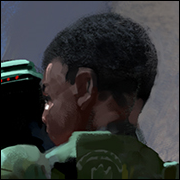|
I never understood Forewards or whatever you call them (NOT prologues). They always spoil the book. Why put them at the beginning? Put them at the end. Actually I'm reading Pedro Paramo and the foreward was written by Gabriel Garcia Marquez and he just writes about his experience finding and reading the book rather than the book itself. That was cool. I only didn't skip it because it started with something immediately engaging like "I arrived in Mexico City on the day Hemingway pulled the trigger." Strategic Tea posted:I personally can't imagine paying £10 for a book and not giving the author the benefit of the doubt and letting them tell the story in the order they want to tell it. Me neither. I understand putting a book down after a page or two but I cannot imagine willingly skipping parts and then continuing to read. I feel like people who do that must be reading for different reasons than me.
|
|
|
|

|
| # ? May 21, 2024 14:23 |
|
I tried skipping the prologue of Frankenstein, then got confused about why Frankenstein was on a boat in the Arctic all of a sudden. Never again
|
|
|
|
ultrachrist posted:I never understood Forewards or whatever you call them (NOT prologues). They always spoil the book. Why put them at the beginning? Put them at the end. Yeah I will skip foreword and introduction but not prologue - would these people skip epilogues? Seems silly
|
|
|
|
what do i need an epilogue for? just move onto the next book time's a wasting
|
|
|
|
cumpantry posted:what do i need [editing] for? just [publish my first draft and] move onto the next book time's a wasting my writing philosophy in a nutshell
|
|
|
|
and that's a good thing!
|
|
|
|
mewse posted:Yeah I will skip foreword and introduction but not prologue - would these people skip epilogues? Seems silly A "bad" prologue sells you on a different type of book than what has actually been written. I remember a fantasy novel had a cool prologue involving bones, wise cracking grumpy gods, and a vague sense of unease. Then chapter 1 was Puck the FarmBoy shoveling poo poo and oh no he accidentally fell into it.
|
|
|
|
DropTheAnvil posted:A "bad" prologue sells you on a different type of book than what has actually been written. I remember a fantasy novel had a cool prologue involving bones, wise cracking grumpy gods, and a vague sense of unease. Then chapter 1 was Puck the FarmBoy shoveling poo poo and oh no he accidentally fell into it. The obvious counterpoint to your argument would be someone picking up The Adventures of Farmer Puck and being all excited by the bucolic whimsy in chapter one, and then feeling betrayed when skeletons start popping out of the ground three chapters later. Thatís not to say every novel with this kind of cold open prologue always lives up to the promise, of courseÖ
|
|
|
|
Some advice videos I've been watching say to get your villain out ASAP, hence why I wanted to do a prologue. What I've been picking up is if you have a strong first chapter, the prologue should be like the cherry on top. Or if it's weak just cut it entirely. I like the idea of not marking the prologue or chapters at all... can't skip it if it doesn't say so. My idea doesn't start with the main villain, but their hench-creature. It won't reappear again until chapter 7 or so, during the MC's second quest. I'm thinking I might have to do some extra chapters from other POVs to show that things are happening in other places simultaneously. I haven't put that much thought into it yet.
|
|
|
|
I think there's better ways to introduce the idea of "there will be monsters / action later" than doing an isolated prologue. I mean, the problem of "I wanted to read about happy farmers and now there's monsters" or "I wanted to read about monsters and now have to slog through 100 pages of farming" persists even with the prologue. Ideally you'd find some way to anticipate the monsters in the farming part. Maybe characters discuss the monsters while farming. Or maybe the farming involves things that mirror what will happen later once there are monsters. Like in the LotR films, there's this scene where the hobbits hide from a farmer after stealing his produce, and that mirrors how they'll hide from monsters not much later. (I realise the LotR films also have an actual prologue but work with me here)
|
|
|
|
The reason I skim prologues isn't that they're inherently bad, it's that when I want to read a book about a novice diplomat with two brains in her head getting involved in local politics and investigating a death, the last thing I want to read is a group of fuckin space chancellors going on about a situation at a fuckin' warp gate. I don't fully skip prologues, and sometimes (like with The Fifth Season) I'll come back and pay more attention to them later, but whew I'm not going to pay attention to some poo poo that often feels more like homework than a fun part of the story. They're background vibes, and I'm not going to let myself get sucked in to characters that disappear quickly--after all, the characters are why I'm reading. I don't agree or disagree with the advice that you need to introduce your villain ASAP; some books thrive on their villain, some benefit from putting it off until later, some books just don't have a villain, or if they do, said villain is only a minor part of the book. If throwing something into a prologue is the best way for you to hint that there's creepy monsters coming up, then the book better benefit from the knowledge of said creepy monsters not being a part of the on-page actions. A Song of Ice and Fire is a pretty good example imo; the creepy ice zombie prologue really underlines how pointless and childish most of the country's political struggles are in the face of a real threat, and makes the game of thrones genuinely seem just like a game instead of something that matters. Quality of the rest of the series nonwithstanding, that was a good and valuable prologue for me.
|
|
|
|
The book I'm trying to sell now has a prologue, but it's short, fun, action-packed, and (most importantly) isn't a flash-forward. And even though it seems completely unrelated to the main plot at first, not only do you learn how it ties in by chapter three, you realize it's the prime mover. So I hope people don't skip it, or else they'll miss what the book is about.
|
|
|
|
I suspect that readers fall into "start reading to see if you like it" and "read reviews to see if you might like it" camps, and that books written to cater to the former will differ from the latter.
|
|
|
|
I tend to skim prologues because they sometimes feel like an author going 'no, no, wait, don't leave - yes, my opening chapters are boring, but there's going to be cool poo poo later, look at my worldbuilding/mysteries!' and it's just like, I don't know, maybe construct things so the early chapters are exciting, too?
|
|
|
|
|
There's nothing wrong with prologues per se, but generally I think Milkfred E. Moore is right. In particular, the point of a story isn't to promise cool stuff later. Also, prologues are a bit of a clichť in fantasy, thanks to A Game of Thrones and The Wheel of Time, I suppose. I think the issue with a "cold open" kind of prologue is that it works well in film, but not in novels, for a few reasons. 1. Films are much shorter so the prologue isn't hanging about and failing to live up to its promise for hours. 2. Films usually need less investment from the watcher than books need from the reader; just wait a few minutes and it'll be over anyway. 3. People usually watch films with other people, so they're less likely to skip because others might be enjoying it. Also, skipping is easy in a book but harder for a film. You don't have a choice about experiencing a film's prologue. 4. People usually watch a whole film in one sitting of two or three hours, rather than several hours spread over a few days. 5. Prologues are marked as different from the rest of the book; a pre-credit scene isn't marked so strongly. You can deal with 5, and novellas or stories don't have 1 and 4 (or you can make the prologue relevant very quickly), but 2 and 3 are intractable issues by virtue of the medium. I suppose the takeaway is that just because something works well in one medium doesn't mean it'll transfer to another. On the other hand, it might. No harm in experimenting.
|
|
|
|
Milkfred E. Moore posted:I tend to skim prologues because they sometimes feel like an author going 'no, no, wait, don't leave - yes, my opening chapters are boring, but there's going to be cool poo poo later, look at my worldbuilding/mysteries!' and it's just like, I don't know, maybe construct things so the early chapters are exciting, too? This is pretty much how I ended up handling the prologue expectation gap issue - I've got my 300-word in-world text excerpt to provide some immediately relevant context and then the exciting interesting poo poo starts going down right in chapter one because gently caress if I'm going to have a dozen chapters of superfluous slice of life boringness before poo poo actually happens - I can't stand writing that stuff so I wouldn't expect my readers to read it or enjoy reading it. Stuporstar posted:
Heh, I have thought (and drawn) way too much about the particulars of my dragons (because I care about how their form informs their movements and behaviors and stuff). Overall I could probably pull off an entire wiki. Would be better organized and easier to maintain than a bunch of web pages, probably. One thing I don't have is conlang stuff because even though there are several different languages spoken in this realm with some of the principal characters being at least bilingual (the fantasy trope in which everyone on the entire giant continent speaks "common tongue" or whatever pisses me off - just look at all the languages spoken in Britain in the middle ages and earlier, and then consider how Britain is not at all a large land mass), I am not a linguist or conlanger by any stretch of the imagination and I am not going to pretend I am, so I'm not making up vocabulary or anything beyond establishing a "vibe", so to speak, mostly through giving names in that language a certain sound and a distinct set of rules to follow. I'm a designer, however, which means I've been obsessing over all my little cultures and their general aesthetic - architecture, clothing, armor, hairstyles, everything - and have been working on bolstering my artistic skills (that anatomy drawing video course linked in the resources thread is very good and worth the money, fyi) so I can eventually draw EVERYTHING. Oh, speaking of languages, I'm reminded of something I've encountered in my story and I'm curious about how other folks handle it: When you have a bilingual character and both their languages are being spoken in a scene, how do you differentiate between languages? I'm currently italicizing dialogue in the "secondary" language in the scene, but then in the next scene, the languages switch positions and what was previously the secondary language is now the primary language, so that would change which language is italicized. I'm otherwise explicit about which language a character is speaking if there's potential for confusion, so maybe that's enough? But I can see how that could get people mixed up, especially if they aren't reading closely, and that's an issue in a few scenes where the character isn't assumed to speak the secondary language so they're basically talking about him while he's standing right there, under the assumption that he doesn't understand them. Maybe this is something I can just not worry about until a future revision, but it's kinda bugging me.
|
|
|
|
Queen Victorian posted:Oh, speaking of languages, I'm reminded of something I've encountered in my story and I'm curious about how other folks handle it: When you have a bilingual character and both their languages are being spoken in a scene, how do you differentiate between languages? One elegant way to do it when relying on English for both is to change the grammar of one of the languagesóa different word order than what weíre used to can be a flag that the speaker has switched from the main characterís mother tongue. Maybe not so drastic as switching from SVO (though Iíve found doing VSO in English has a ring to it I quite like) but in a lot more languages adjectives follow their noun, prepositions are actually postpositions, and so on. Actually using other languages like I do actually comes with a lot more hurdles. Iíve seen it done most simply in the book Tomb of Sand, which is written to reflect the bilingual reality of everyday speakers in India, so it just throws in Hindi wherever and lets the readers figure it out for themselves. You only speak English? Tough poo poo, look it up. But then Booker Prize winning books attract the kind of readers who are up for that challenge. Sff novels not so much. So I have to play around with solutions that do a little more handholding, even if the character is speaking an existing other language rather than a conlang. Iím currently trying out a mix of whole sentences with parenthesized translation and throwing non-English words into English sentences to help people pick up commonly used words through context (which Tomb of Sand does a lot). I tend to start scenes in the deep end, with characters actually speaking whatever languages theyíre speaking, and gradually shift to mostly English once the characters are all on the same page re. language and getting down to business (and the actual plot). Why I start on hard-mode is cause language choice is a form of verbal fencing for my protagonist, who code-switches depending on need, but also says poo poo other people have to translate to trip them up (or trips themself and fucks up their code-switching). Iím not recommending anyone do this unless they absolutely love playing with language as much as I do. And I know alotta readers are gonna bounceóbut I took to heart Emberto Ecoís essay on training readers to become your readers, and got no time for anyone not down for my bullshit cause lifeís too short and Iím never gonna write a bestseller anyway so I might as well follow my muse
|
|
|
|
Or use webdings and grawlixes, we'll figure it out in context. Readers don't know what Chewbacca's saying, but his body language is always pretty clear. Han can speak for him without an exact translation and fill in the details.  "@$&#!" "@$&#!" "I don't know, fly casual!" I'm not sure I'd read an entire page of that, so maybe it only works in the comics. Waffle! fucked around with this message at 07:52 on Jan 21, 2024 |
|
|
|
use a homestuck typing quirk to signify a strong accent /joking
|
|
|
|
I usually don't mention it unless it's important. Like, I'll point out what language someone is speaking if it's thematically relevant, or if there is another character in the scene who wouldn't understand what's being said (and this is plot relevant somehow). Like quote:"Welcome to our family", she said to Bob. Her smile faded as she leaned over Laurie's shoulder and said in French: "I told you not to bring that man here." If you want that situation to go on for a while, I think you could establish some typography thing (e.g. italics, or a different font, or << >> style quotation marks) to mark one of the languages. I wouldn't try to match the grammatical structure, although it would be fun / immersive to actually use quirks of the language in question. E.g. in Spanish it's pretty hard to be evasive about the gender of a person, and so on.
|
|
|
|
In her Terra Ignota series, Ada Palmer handles the various languages with different quotations marks (i.e. ďEnglishĒ, ęFrenchĽ,「Japanese」) but that's easier to pull off with IRL languages who already have their own typographic conventions
|
|
|
|
When I think of prologues I tend to like, it's something like Leviathan Wakes. It's a missing girl story, so, here's the missing girl, and here's some basic idea of how the world works, and here's some creepy space horror. It leaves you wondering just what the protagonists will find when they reach Julie, even if I think it's a bit cheeky in how it leads you to believe she's still on the Scopuli. Holden gets on the Scopuli train in Chapter 1, Miller gets on the missing girl train in Chapter 2. I think that's all pretty good, and it helps the twist that that Julie is dead and has been for a while which I don't think would land as well if we'd never met her. When I think of prologues that I tend to dislike, it's like The Emperor's Blades. Here's a guy named Tan'is and he's a Csestriim and he's disgusted by the fact his daughter has a sickness and the sickness is aging and he's dispassionate and emotionless and totally not elves, dad, and he stabs his daughter in the art. I never finished Blades, but my understanding is that all that stuff doesn't enter the story until the next book in the series. So, what's it doing there? I didn't like Blades much, but it didn't help that the prologue felt disconnected from the hero's journey stuff in the opening chapters. I grappled with including a prologue in Shadow, although I never did. The core idea that the protagonist, Sabra, is wracked by nightmares of the end of the world and so a creepy prologue feels like the exact thing you'd do in a novel featuring that. But I've always felt richly-illustrated prophetic dreams are a bit pat, the sort of thing to make the reader feel smart when they go back and see all the 'foreshadowing', and also not truthful to the reality of the worst nightmares I've had which is that I don't really remember them upon waking. And if Sabra doesn't remember them, then the reader shouldn't see them, because I've found that readers sometimes get annoyed when they know things that characters don't. So, no prologue. But on the other hand, conventions are popular for a reason and maybe a foreshadowing-heavy nightmare prophecy prologue might help readers settle in. But on my third hand, the story is more of a thriller about her quest to track down the guy who shot her dad, so, opening the story with apocalypse dreaming might leave readers feeling betrayed. Hmm? Oh, yes. Diet coke is fine.
|
|
|
|
|
Milkfred E. Moore posted:I grappled with including a prologue in Shadow, although I never did. The core idea that the protagonist, Sabra, is wracked by nightmares of the end of the world and so a creepy prologue feels like the exact thing you'd do in a novel featuring that. But I've always felt richly-illustrated prophetic dreams are a bit pat, the sort of thing to make the reader feel smart when they go back and see all the 'foreshadowing', and also not truthful to the reality of the worst nightmares I've had which is that I don't really remember them upon waking. And if Sabra doesn't remember them, then the reader shouldn't see them, because I've found that readers sometimes get annoyed when they know things that characters don't. So, no prologue. But on the other hand, conventions are popular for a reason and maybe a foreshadowing-heavy nightmare prophecy prologue might help readers settle in. But on my third hand, the story is more of a thriller about her quest to track down the guy who shot her dad, so, opening the story with apocalypse dreaming might leave readers feeling betrayed. Iím grappling with a similar problem in one of my novels. I wrote a prologue of a leviathan awakening deep in an ocean, crawling onto barren ice, and trying to scratch a message in it. Itís the protagonist in a completely dissociated state, and their scattered memory of that event, describing themself as a monster to keep their mental distance from it. The first chapter then starts with them waking up in the hospital trying to piece their poo poo together. (This is a well-worn trope, but with all the alien poo poo to come, I feel like a familiar trope grounds the story enough to keep the reader from getting totally lost in all the weird.) In the course of the novel, all those monstrous qualities that helped them survive resurface and the character has to come to terms with themself (selves?). Iíve considered the problems with this kinda prologue for a long time, and thought of breaking up the prologue into bits between chapters or something, spaced out as the character remembers bits and pieces. Iím still not sure if thatís the better option or not. In your case, you might want to consider doing the same. A prophetic dream could possibly repeat itself enough times to be gradually remembered and pieced together by the protagonist.
|
|
|
|
My noo book is out. My newb ook. My neubuk.
|
|
|
|
!!!!!!!!!!!
|
|
|
|
Already bought my kindle copy, hell yeah to weird sci-fi
|
|
|
|
Hell yeah! Congrats!
|
|
|
|
I've been utterly worthless and unmotivated at writing since mid-November. I should have just ignored Nano completely like usual.Stuporstar posted:Iím grappling with a similar problem in one of my novels. I wrote a prologue of a leviathan awakening deep in an ocean, crawling onto barren ice, and trying to scratch a message in it. Itís the protagonist in a completely dissociated state, and their scattered memory of that event, describing themself as a monster to keep their mental distance from it. The first chapter then starts with them waking up in the hospital trying to piece their poo poo together. (This is a well-worn trope, but with all the alien poo poo to come, I feel like a familiar trope grounds the story enough to keep the reader from getting totally lost in all the weird.) In the course of the novel, all those monstrous qualities that helped them survive resurface and the character has to come to terms with themself (selves?). It might just be me speaking, but showing your protagonist as a leviathan/a monster as a metaphor is likely going to go over the heads of a LOT of readers, who will either be waiting for your protagonist to actually change into a monster, or will not understand that the monster scratching the message is your protagonist. In one of my put-on-the-shelf projects, I had one character who has had a "prophetic" dream many times over several years and as such remembers it. In that book, though, the events which actually happen would slowly diverge from what was shown in the dream more and more for reasons which wouldn't be clear until the end. Although one of the reasons for shelving the idea was that I could not figure out how to make the reveal not feel like an rear end-pull, and I couldn't figure out any logical way to foreshadow the reveal. (Unrelated, I find Prophecy to have been tremendously overused. I'm greatly tempted to put in a short scene where my protagonist encounters a fortune-teller who offers to tell her fortune, and she declines. I should absolutely resist the temptation. if I'm not going to use prophecy, then by definition, the scene wouldn't be relevant later on, so it feels like it would be a waste of words. And it'll come across as The Author stopping the story to complain about a trope, because that's exactly what it is.)
|
|
|
|
General Battuta posted:My noo book is out. My newb ook. My neubuk. oh poo poo
|
|
|
|
Stabbey_the_Clown posted:It might just be me speaking, but showing your protagonist as a leviathan/a monster as a metaphor is likely going to go over the heads of a LOT of readers, who will either be waiting for your protagonist to actually change into a monster, or will not understand that the monster scratching the message is your protagonist. Itís not a metaphor. Well, it is, but itís also quite literal because itís scifi I did consider the reader not understanding that the monster is the protagonist, if I go the prologue route, and thatís actually a huge plus in my book cause it would take several clues over the course of the story for it to click as the transformation slowly happens again. That said, if I were writing lit fic Iíd still go for it cause Iíd trust it not to go over the heads of a literary reader, or for them to at least go with whatever as they slowly figure it out Stuporstar fucked around with this message at 03:03 on Jan 24, 2024 |
|
|
|
Stuporstar posted:I did consider the reader not understanding that the monster is the protagonist, if I go the prologue route, and thatís actually a huge plus in my book cause it would take several clues over the course of the story for it to click as the transformation slowly happens again. Oh, in that case, it's all good.
|
|
|
|
General Battuta posted:My noo book is out. My newb ook. My neubuk. this rules............. i'm almost to chapter 3 (the audiobook is really great).... i love it
|
|
|
|
People have commented that I should be more careful about my grammar because I occasionally mess up tenses and so on, but I'm not sure where/how to relearn the terrible English language after years of gaming and really dumb forums posts have driven its rules out of my mind. Also congrats on the new book, General Battuta!!!
|
|
|
|
As a copy editor in a previous life, let me tell you, you'd be amazed how poor the grammers are of some people who have made millions of dollars writing books.
|
|
|
|
Yeah, that sounds like something a proofreader or copy editor can sort out for you. More important to get the writing done.
|
|
|
|
Whirling posted:People have commented that I should be more careful about my grammar because I occasionally mess up tenses and so on, but I'm not sure where/how to relearn the terrible English language after years of gaming and really dumb forums posts have driven its rules out of my mind. Don't stress about it. Best way for a native speaker to improve their grammar is reading books with good grammar. If you want to get more formal about it, there's a ton of books, mostly interchangeable; I'm fond of an old one called Right Words, Right Places because it juxtaposes the grammar with the rhetoric.
|
|
|
|
Just do what I do and write in 1st person in a casual dialect, then no one can criticize your grammar cause itís bad on purpose
|
|
|
|
Whirling posted:People have commented that I should be more careful about my grammar because I occasionally mess up tenses and so on, but I'm not sure where/how to relearn the terrible English language after years of gaming and really dumb forums posts have driven its rules out of my mind. I disagree; if you're making mistakes, then you should work to fix them. I mean no-one is going to die if you don't, but getting tense right is pretty basic.
|
|
|
|
sebmojo posted:I disagree; if you're making mistakes, then you should work to fix them. I mean no-one is going to die if you don't, but getting tense right is pretty basic. Itís also one of the hardest things to correct in post, Iíve found, especially if you have global issues. I say this after deciding to change from present to past tense midway through a project. What a pain in the rear end!
|
|
|
|

|
| # ? May 21, 2024 14:23 |
|
Whirling posted:People have commented that I should be more careful about my grammar because I occasionally mess up tenses and so on, but I'm not sure where/how to relearn the terrible English language after years of gaming and really dumb forums posts have driven its rules out of my mind. Keep writing. Whatever happens, whatever criticism you get, keep writing. However, before you share your writing, fix your tenses. Get the basics down.
|
|
|






































